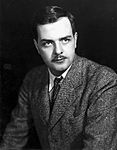New Democratic Party leadership election, 1961
|
|
||||||||||||||||||||||
|
||||||||||||||||||||||
|
||||||||||||||||||||||
|
||||||||||||||||||||||
| Date | July 31 – August 4, 1961 |
|---|---|
| Convention | Ottawa, Ontario |
| Resigning leader | position created |
| Won by | Tommy Douglas |
| Ballots | 1 |
| Candidates | 2 |
position created
New Democratic Party leadership elections
The 1961 New Democratic Party founding convention was held in Ottawa from July 31 to August 4 to elect a leader of the New Democratic Party (NDP) of Canada. This convention formally closed down the Co-operative Commonwealth Federation (CCF) party, the New Party clubs, and merged them with the Canadian Labour Congress (CLC) to form the NDP. It is also known for the divisive leadership vote in which Saskatchewan Premier Tommy Douglas was elected over national CCF leader Hazen Argue. Over 2000 delegates attended the five-day convention held at the Ottawa Coliseum.
By 1960, progress was being made in creating a new party from the old CCF, and the trade union movement as represented by the CLC. There were still leadership issues left unresolved in the CCF in the summer of 1960, and the party's president, David Lewis was forced to try to keep the federal House of Commons leader from causing an open leadership crisis. Since M. J. Coldwell, the CCF's national leader, lost his seat in the House of Commons, he constantly was thinking of resigning his post, but was asked by the party, many times, to stay on as national leader. With Coldwell's defeat, the CCF caucus chose Hazen Argue as the new House leader. During the lead-up to the 1960 CCF convention, Argue was pressing for Coldwell to step down. This leadership challenge would mean that plans for an orderly transition to the New Party would be in jeopardy, something that the CLC's and CCF's organizers, headed by Lewis, did not want. They wanted as their leader Saskatchewan premier Tommy Douglas, the most successful social democratic leader in Canada. To prevent their plans from being derailed, Lewis had to try to find a way to persuade Argue not to force a vote on the question of the party's leadership at the convention: Lewis was unsuccessful. There was a split between the parliamentary caucus and the party's executive that made it to the convention floor. Coldwell quit and Argue became the last National Leader of the CCF.
...
Wikipedia


